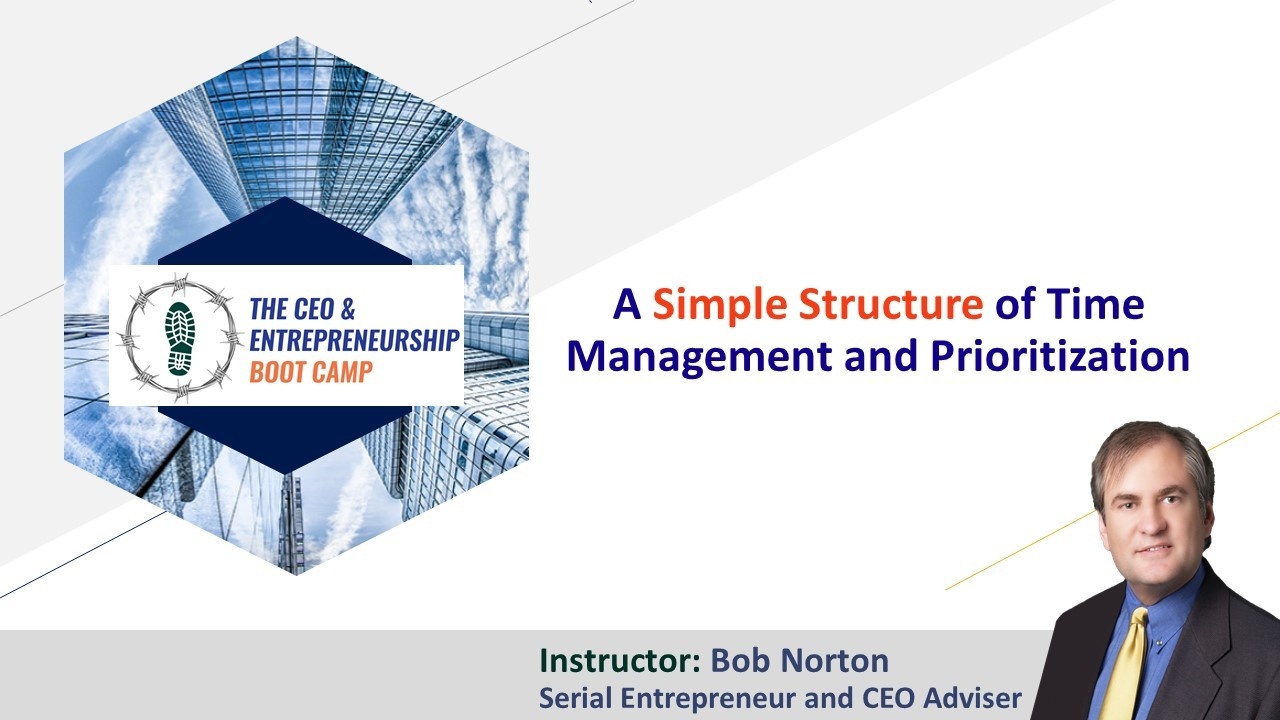A Simple Structure of Time Management and Prioritization

Get More Done, but Also Get the Right Stuff Done
Effective time management is accomplished by using the Pareto principle of 80-20. Making sure that 80% of your time is spent on the 20% of the work that makes most of the difference. Some have called this the Picasso work. Where creativity, talent or experience is critical. The book Blink by Malcolm Gladwell also discusses this principle and calls it reaching the level of unconscious competence. Brain science and scanning have recently proven the biology behind this, whereby human beings used neuroplasticity to rewire their brain for certain sophisticated tasks. This is why experts who have spent 10,000 hours or more can potentially answer or do something in the blink of an eye. Where the book title comes from.
There are some things experts can do in hours, or even minutes, that others could never accomplish in weeks or even months. That is the invisible value of five or more years of experience, When things become reflex and unconscious. Sport stars call it muscle memory or being in the zone, but what it really is neuroplasticity kicking in and the unconscious mind taking over for the conscious mind. Martial artists make this happen through years of practice, too. They don't consciously think, they automatically react. This is just one reason why time management can have a huge impact on people's productivity.
Time management is about structuring your time around the priorities of the business, sometimes not what you want to be doing but what you need to be doing. Of course, it's always best to delegate things you do not enjoy because you are not likely to be good at them. And life at work is much more fun when you do the things you are best at and delegate the rest.
I personally use four main levels of planning to be effective and productive, and to focus on what is most important for the daily, week, month and year:
- A daily to-do list that should fit on a post-it note. Of course, this must also dovetail with my calendar time commitments. Which could be scheduled weeks or months in advance. And the care and feeding of employees to keep them productive, which is an ongoing and significant portion of any manager's time. That's why my own priorities must be a pretty short list because keeping the team productive is always the most important priority.
- Weekly - Sunday night, dedicated thinking time to make the priority list for the week and get myself and other staff focused on the key initiative that should get done that week
- Monthly Management By Objective tasks for everyone, and each department.
- And, of course, annual strategic planning that is updated quarterly and gets an off-site staff deep dive annually. This will vary by team size and team experience. But every company should dedicate time to it annually. Startups may make very rapid adjustments monthly or even weekly, but an established organization needs to have far more predictable planning and tasks with a longer planning timeline. Organizations over 100 employees likely require detailed plans for the quarter to align the many resources they have and make them productive.

To learn more, click here
Personal preference and work-life balance will certainly play a role in this. However, I think if you use these four levels of time management and planning, you may find your productivity climbing.
We all tend to get caught up in the urgent and sometimes forget the important and the strategic, which could have a far higher impact in time. Our productivity is sucked up by emails, phone calls and interruptions every day. These are usually “urgent” but often not important.
Research has shown that a monthly management by objective process and meeting for goal setting enhances corporate value creation in companies by 56%. That's a huge number when compounded over the years. So, it's really the difference between a highly successful company and one that goes sideways or bankrupt.
We offer a complete training on Peter Drucker's management by objective (MBO) process, which has very powerful psychological impact on people and teams. Objectives and key results (OKR) is effectively the same thing was a different name but has become more popular because of its use by Google, Intel another venture capital driven companies. And purchase our course on goal setting here. This simple course, when given to a team and used well, is guaranteed to have a significant impact on any company. In fact, you will find all market leaders do this well. Though, 80 to 90% of companies fail to have discipline around their goal setting. This process enforces accountability on everyone, and good people want accountability. It will even protect them from being given more work than they can handle.
In the classic book Good to Great by Jim Collins he has a wonderful diagram with four quadrants where one access is disciplined, and the other access is innovation. Companies that become great have both discipline through processes like this throughout their organization, and the creativity and processes for innovation. Lots of discipline is about goal setting to focus, both individuals and teams. In some organizations too restrictive or too much process can crush creativity and innovation and CEO's must be on the lookout to prevent this. Another famous quote by The Father of Management, Peter Drucker, is organizations having two jobs, innovation and marketing. Most everything else is more generic and easier to do because innovation and marketing require high creativity, which very few people possess.
Get your discipline around goal setting down in any organization and morale will improve, and you will also attract and keep better quality of staff. There are too many benefits to list here from this process, but decades of research have shown it is a foundation of good management. Most organizations fail to maintain the important elements of this process and fall into too much micromanagement, which is far less productive than giving people larger chunks of work and letting them take ownership and responsibility. This is not only empowering, but allows the employee more freedom to be creative and to be productive by planning their time for the week or month better also.
Join Live Webinar on 12th April 2022
Bob Norton is a long-time Serial Entrepreneur and CEO with four exits that returned over $1 billion to investors. He has trained, coached and advised over 1,000 CEOs since 2002. And is Founder of The CEO Boot Camp™ and Entrepreneurship University™. Mr. Norton works with companies to triple their chances of success in launching new companies and products. And helps established companies scale faster using the six AirTight Management™ systems. And helps companies successfully raise capital.
Call (619) SCALE06 or email [email protected] for a complementary strategic consultation.


